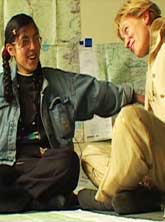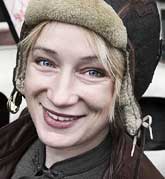Masuda Sultan was born in Kandahar, Afghanistan, and fled to the U.S. with her family when she was 5. At age 17 she had an arranged marriage to a stranger 14 years her senior — a marriage she struggled to maintain and then hastily fought, eventually being granted a divorce, one of the first in her close-knit Afghan community. In July 2001, she returned to Kandahar, to explore her family roots. Since then she has worked on peace-building initiatives and reconstruction efforts for the Afghan people. Here she reflects on her work with women in Afghanistan.
MY WAR AT HOME
By Masuda Sultan
Washington Square Press
In late 2005, I went to Afghanistan to realize the dream of bringing together women from all over the country to provide their ideas on the most important treatise, the new draft constitution. Afghan women leaders told me their opinions were often unheard or not valued. Under the umbrella of our grassroots organization, Women for Afghan Women, we had managed to raise enough money to make this happen on a shoestring budget. Our goal was to provide the women a forum to organize, and to then take their collective ideas to the highest authorities and make them heard around the world. Further, we planned to gather in the former stronghold of the Taliban, the spiritual capital and also the city of my birth, Kandahar. This was the last place anyone thought such an event was possible.
After incredible challenges related to security issues, logistical challenges, cultural hurdles, and more than a few cases of divine intervention, we all made it to Kandahar. More than 40 women from various ethnic groups, a wide range of ages, educated and illiterate, came together for four days of strategizing. In these four days they debated Islam and history, shared personal struggles, cried and danced, all as the electricity of war-torn Afghanistan came and went.
The document the women produced was called “The Afghan Women’s Bill of Rights,” and it listed specific rights they wanted protected in the new constitution including mandatory education for girls, provisions for healthcare, and even equal pay for equal work. In many ways their demands were more progressive than what American women could have ever imagined coming from Afghan women, and they used the Islamic principles to justify their arguments.
While this was going on I often thought of my aunt Khala Sherina, my mother’s older sister who lives less than a mile away, hoping she could come witness our groundbreaking gathering. Khala Sherina lived in the same room she was married into more than 24 years ago, and six children later still had to get her husband’s permission to travel to the homes of her relatives. I thought Khala Sherina would enjoy seeing me and the women I had brought to her city.
Immersed in all the excitement of the conference in that compound in Kandahar, despite all the dreaming and wishing and hoping that filled our magical days there, the fact that my own aunt Khala Sherina was not even allowed to attend gnawed at me like a nasty insect in a beautiful forest. I expected that she might not be allowed to participate in the conference, but I had hoped she would at least be allowed to visit. I had gone to her house one morning to pick her up, even if just to have tea with the women, but her husband would not allow her to travel with me to the conference site. When he told me that she was too busy with the laundry to join us, she agreed, but later whispered that she had really wanted to visit the conference with me. I left swallowing quickly to avoid tears, but I knew that even if I insisted on taking Khala Sherina with me that day, she would have to deal with the repercussions on her own long after I was gone. Most women’s rights work happens in the public arena, addressing the law, opportunities for education and work, and the ability to travel and receive health care. But how do you change women’s most intimate space, and the power exercised over them by their own families? What do you do when the law changes but a husband refuses to let his own wife take part in a “liberation,” or a father his daughter? Worse, what do you do when they don’t want you to see or speak with “their” women? People like me enter women’s rights work hoping to make big changes in many people’s lives. But I have learned that change will come person by person and not all in one earthquake.
Copyright (c) 2006 by Masuda Sultan. Reprinted by permission. Excerpted from the book MY WAR AT HOME by Masuda Sultan, published by Washington Square Press, an imprint of Simon & Schuster, Inc.


